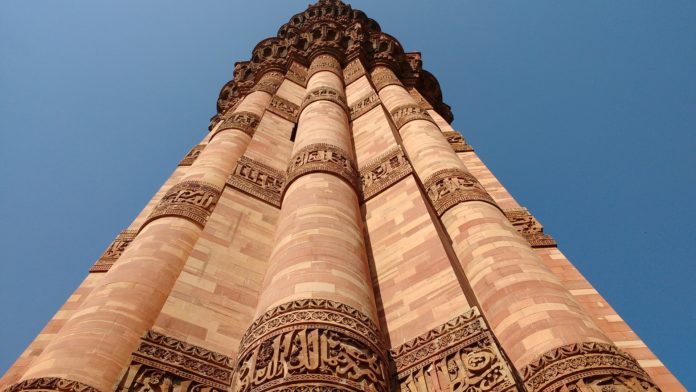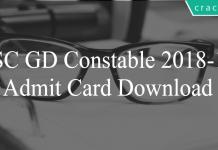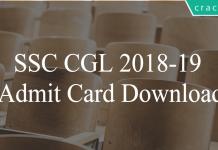SSC CGL Tier 1 exam is around the corner. Tier 1 exam consists of 4 sections. Out of the 4 sections, general awareness section contains questions from history. This blog will elaborate how to prepare History for SSC CGL.
Every year, millions of aspirants take this exam. Hence, the gradient could be steep, and the chances of someone making the cut is bleak. So, to have a decent chance, you have to scout for every single mark available. Candidates can prepare for SSC CGL online to improve their odds.
History for SSC CGL:
Usually, SSC asks 5-6 questions from this section amounting to 10-12 marks. Hence, it is important that aspirants must have an idea about how to prepare History for SSC CGL.
100 SSC CGL (latest pattern mocks) – Rs. 199
SSC CGL Free Study Material – 18000 Questions
Aspirants can have a look at previous year papers of SSC CGL to have an idea about the questions asked. SSC CGL mock tests will help to enhance the test taking strategy of aspirants.
How to prepare History for SSC CGL:
SSC asks questions usually from NCERTs. Hence, it is always advisable to prepare from them. Aspirants would have studied most of the syllabus of History for SSC CGL during schooling. So, aspirants will not have to start afresh. The challenge is to consolidate everything that you have learnt during years of schooling.
SSC seldom asks questions from global history. Hence, candidates can limit themselves to topics relevant to Indian context while preparing History for SSC CGL exam.
Indian history can be broadly classified into 3 eras.
1.Ancient History
2.Medieval History
3.Modern History
Note: The topics given below are just indicative and by no means exhaustive.
Ancient History:
This is the period from the start of known human history to about 1000 AD. Palaeolithic, Neolithic and Chalcolithic ages and their characteristics are important. The most important part of Ancient History is Indus Valley Civilization.
Read about Harappa, Mohenjodaro, Sindh. Learn about the tools used, the city structure, Citadels of Indus Valley Civilization.
The Magadha, Maurya and Gupta empires, achievements of Ashoka, Kalinga war, Ashoka embracing Buddhism, the extent of the Mauryan Empire are some topics of importance.
Birth of Gautama, his travel and enlightenment are important. Also, read about Kapilavastu, Lumbini, Bodh Gaya, Ajanta and Ellora caves and other significant places. Read about Mahaveer Jain and Jainism.
Battle of Hydapses, Invasion of India by Alexander are some points where the global history brushes against Indian history. Hence, these points of contact are very important.
Read about various earlier kingdoms such as Rashtrakudas, Chalukyas, Cheras, Cholas, Pandyas, Pallavas, etc. Achievements of Raja Raja Chola and Rajendra Chola such as the building of Tanjore big temple, annexing Odisha, Bengal, Sri Lanka and influence on parts of Indonesia, Malaysia and Singapore are very important. Also, read about Grand Anaicut built by Karikal Chola.
Download Ancient History Notes PDF
Medieval History:
Medieval history starts approximately from 10th century AD to the fall of the Mughals. The invasion of Mohammad Ghazni, Mohammad Ghori are some events of importance.
Other significant events in the first half of this period include the establishment of Delhi Sultanate, Khilji, Tughlaq, Lodhi dynasties, construction of Qutb Minar, various emperors such as Qutb Ud Din Aibak, Iltumish, Ibrahim Lodhi.
The ascent and fall of Vijayanagar and Bahmini kingdoms is also an important topic.
The first battle of Panipat marks the change in the course of this period. Babur defeated Ibrahim Lodhi to establish the Mughal dynasty, and the Mughals and Marathas dominate the latter half of this period.
The Mughal Dynasty, Akbar, Din-i-ilahi, Bairam Khan, Sher Shah Suri, Shahjahan, Construction of Taj Mahal, Aurangazeb are some important topics.
Another parallel series of events are the birth of Sikhism and the advent of colonial powers. The clash of Marathas and Mughals is important.
Download Medieval History Notes PDF
Modern History:
Modern history starts with the advent of Vasco-da-Gama. Jahangir giving the nod for the establishment of British East India company marks the change in the course of history during this period.
Read about the French East India Company and the Dutch East India Company though these companies were not of much significance in the history.
Some events of importance are the battles of Plassey, Buxar, Wandiwash, etc. Read about the formation of Bombay and Madras. Various Viceroys and their reforms and policies are very important.
The sepoy mutiny of 1857 and the takeover of control by the British Empire from the East India Company are some of the most significant events during this period.
Other important events are Freedom struggle of India, Various freedom fighters, the establishment of Arya Samaj, Brahma Samaj, Swadeshi movements, the formation of INC, Theosophical Society, Non-co-operation movement, Quit India movement, etc.
Also, Jallianwala Bagh Massacre, Chauri Chaura incident, Black Hole tragedy, Bengal famine, Dandi March, India’s participation in the World Wars, Independence of India and Pakistan, Assassination of Mahatma Gandhi, Drafting of Constitution, etc are important.
Though questions from the period after Gandhi do not appear often, it is important to know at least the events of significance. Some of them are MISA, operation blue star, the assassination of Indira Gandhi and Rajiv Gandhi, Opening up of the Indian economy in 1991, 5-year plans, etc.
Download SSC CGL 2018 Syllabus PDF
Other important topics:
Some topics that deserve additional importance are Chelmsford reforms, Macaulay’s recommendations, Minto-Morley reforms, Zamindari system,
Various Governor Generals and Viceroys, Freedom fighters and their ideologies, etc.
Remember important battles, the sides that fought them and the year. Try to use mnemonics to remember important dates.
Since mastering this section cannot guarantee you that questions will be from the topics you studied, candidates must know when to move on. Practice free tests on General Knowledge for SSC.
SSC CGL Solved Previous papers
Aspirants can read about how to prepare general awareness for SSC CGL to get an overall picture of the section.
Read about general science preparation tips for SSC CGL.






[…] History […]